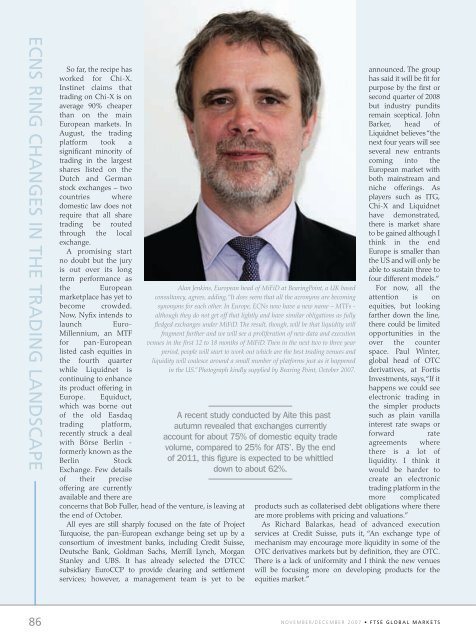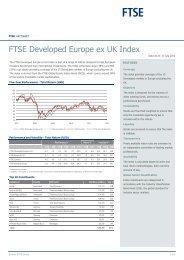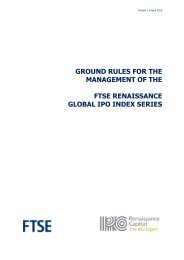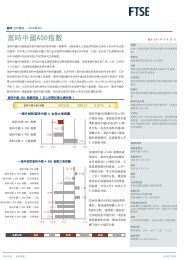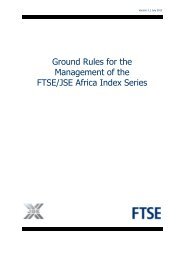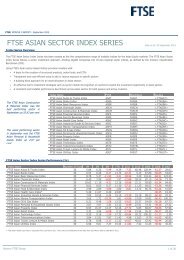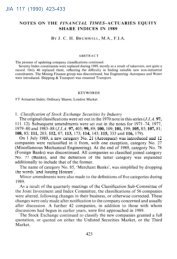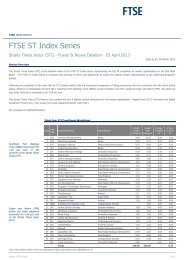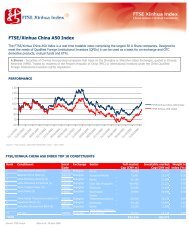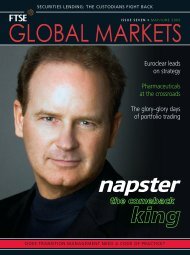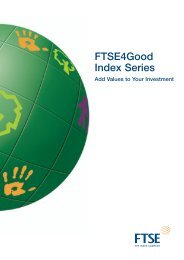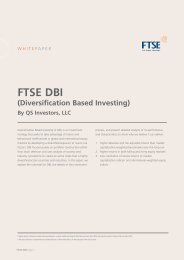Section 2 - FTSE
Section 2 - FTSE
Section 2 - FTSE
Create successful ePaper yourself
Turn your PDF publications into a flip-book with our unique Google optimized e-Paper software.
ECNS RING CHANGES IN THE TRADING LANDSCAPE<br />
86<br />
So far, the recipe has<br />
worked for Chi-X.<br />
Instinet claims that<br />
trading on Chi-X is on<br />
average 90% cheaper<br />
than on the main<br />
European markets. In<br />
August, the trading<br />
platform took a<br />
significant minority of<br />
trading in the largest<br />
shares listed on the<br />
Dutch and German<br />
stock exchanges – two<br />
countries where<br />
domestic law does not<br />
require that all share<br />
trading be routed<br />
through the local<br />
exchange.<br />
A promising start<br />
no doubt but the jury<br />
is out over its long<br />
term performance as<br />
the European<br />
marketplace has yet to<br />
become crowded.<br />
Now, Nyfix intends to<br />
launch Euro-<br />
Millennium, an MTF<br />
for pan-European<br />
listed cash equities in<br />
the fourth quarter<br />
while Liquidnet is<br />
continuing to enhance<br />
its product offering in<br />
Europe. Equiduct,<br />
which was borne out<br />
of the old Easdaq<br />
trading platform,<br />
recently struck a deal<br />
with Börse Berlin -<br />
formerly known as the<br />
Berlin Stock<br />
Exchange. Few details<br />
of their precise<br />
offering are currently<br />
available and there are<br />
concerns that Bob Fuller, head of the venture, is leaving at<br />
the end of October.<br />
All eyes are still sharply focused on the fate of Project<br />
Turquoise, the pan-European exchange being set up by a<br />
consortium of investment banks, including Credit Suisse,<br />
Deutsche Bank, Goldman Sachs, Merrill Lynch, Morgan<br />
Stanley and UBS. It has already selected the DTCC<br />
subsidiary EuroCCP to provide clearing and settlement<br />
services; however, a management team is yet to be<br />
announced. The group<br />
has said it will be fit for<br />
purpose by the first or<br />
second quarter of 2008<br />
but industry pundits<br />
remain sceptical. John<br />
Barker, head of<br />
Liquidnet believes “the<br />
next four years will see<br />
several new entrants<br />
coming into the<br />
European market with<br />
both mainstream and<br />
niche offerings. As<br />
players such as ITG,<br />
Chi-X and Liquidnet<br />
have demonstrated,<br />
there is market share<br />
to be gained although I<br />
think in the end<br />
Europe is smaller than<br />
the US and will only be<br />
able to sustain three to<br />
four different models.”<br />
For now, all the<br />
attention is on<br />
equities, but looking<br />
farther down the line,<br />
there could be limited<br />
opportunities in the<br />
over the counter<br />
space. Paul Winter,<br />
global head of OTC<br />
derivatives, at Fortis<br />
Investments, says,“If it<br />
happens we could see<br />
electronic trading in<br />
the simpler products<br />
such as plain vanilla<br />
interest rate swaps or<br />
forward rate<br />
agreements where<br />
there is a lot of<br />
liquidity. I think it<br />
would be harder to<br />
create an electronic<br />
trading platform in the<br />
more complicated<br />
products such as collaterised debt obligations where there<br />
are more problems with pricing and valuations.”<br />
As Richard Balarkas, head of advanced execution<br />
services at Credit Suisse, puts it, “An exchange type of<br />
mechanism may encourage more liquidity in some of the<br />
OTC derivatives markets but by definition, they are OTC.<br />
There is a lack of uniformity and I think the new venues<br />
will be focusing more on developing products for the<br />
equities market.”<br />
Alan Jenkins, European head of MiFiD at BearingPoint, a UK based<br />
consultancy, agrees, adding,“It does seem that all the acronyms are becoming<br />
synonyms for each other. In Europe, ECNs now have a new name – MTFs -<br />
although they do not get off that lightly and have similar obligations as fully<br />
fledged exchanges under MiFiD. The result, though, will be that liquidity will<br />
fragment further and we will see a proliferation of new data and execution<br />
venues in the first 12 to 18 months of MiFiD. Then in the next two to three year<br />
period, people will start to work out which are the best trading venues and<br />
liquidity will coalesce around a small number of platforms just as it happened<br />
in the US.” Photograph kindly supplied by Bearing Point, October 2007.<br />
A recent study conducted by Aite this past<br />
autumn revealed that exchanges currently<br />
account for about 75% of domestic equity trade<br />
volume, compared to 25% for ATS’. By the end<br />
of 2011, this figure is expected to be whittled<br />
down to about 62%.<br />
NOVEMBER/DECEMBER 2007 • <strong>FTSE</strong> GLOBAL MARKETS


